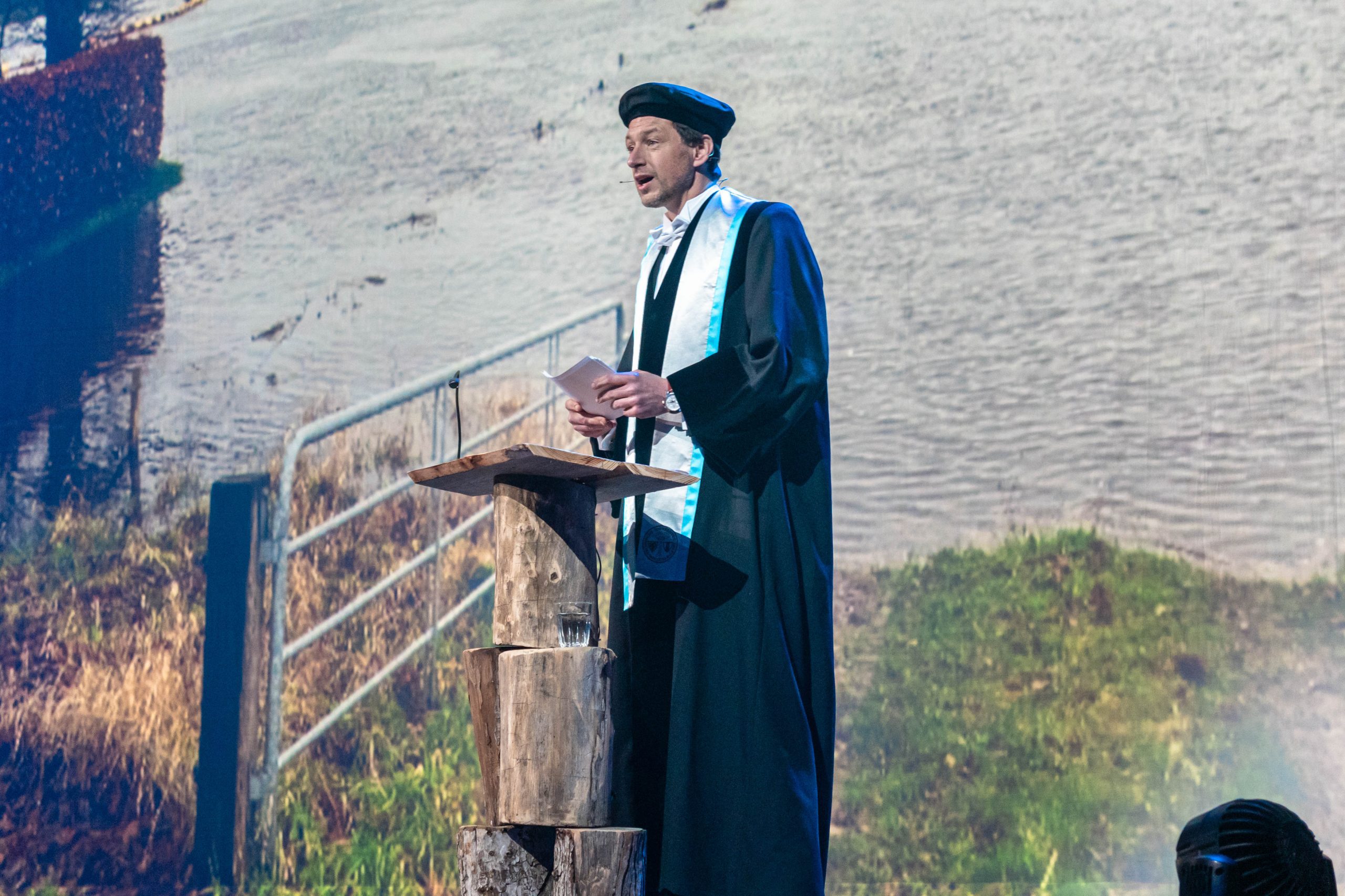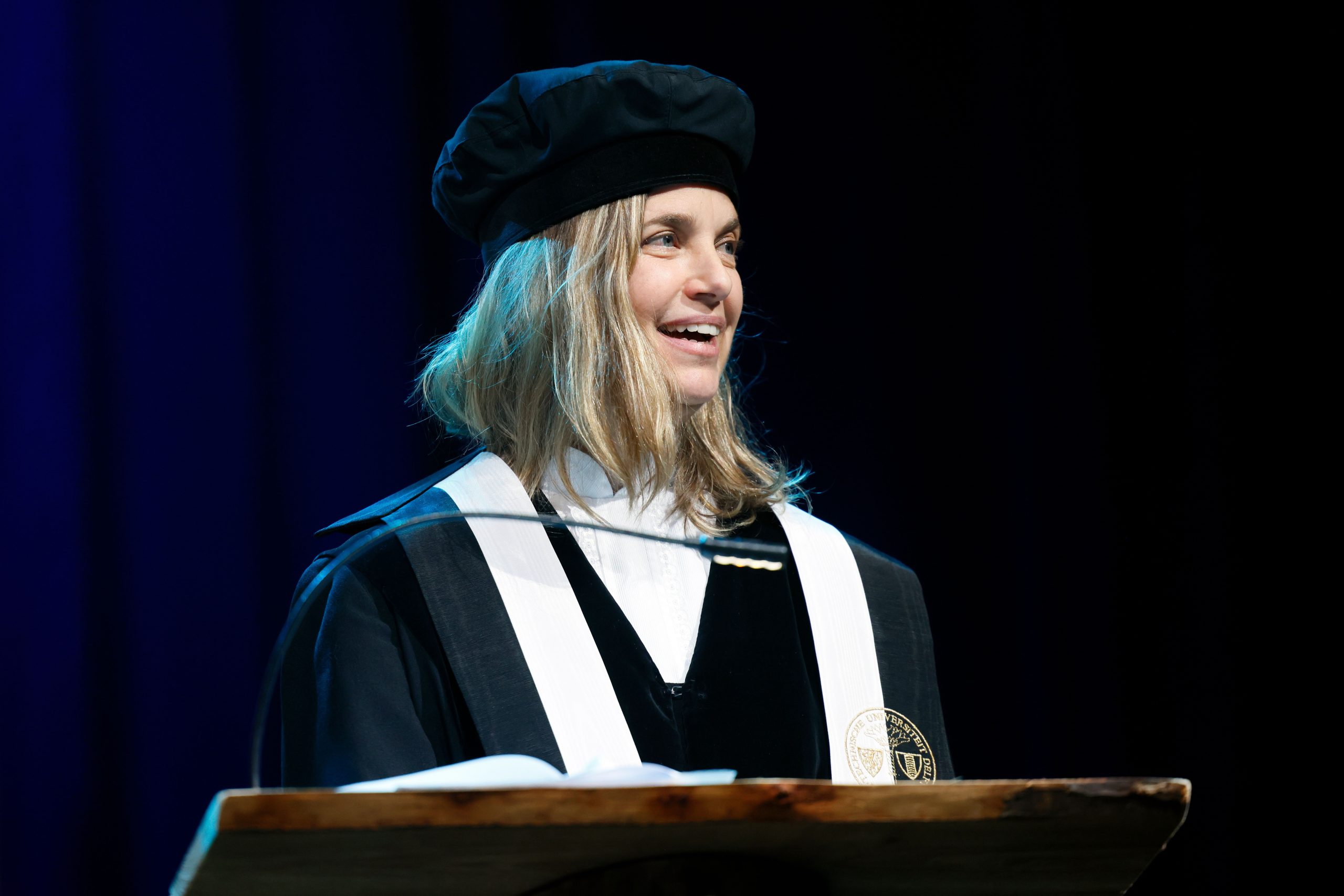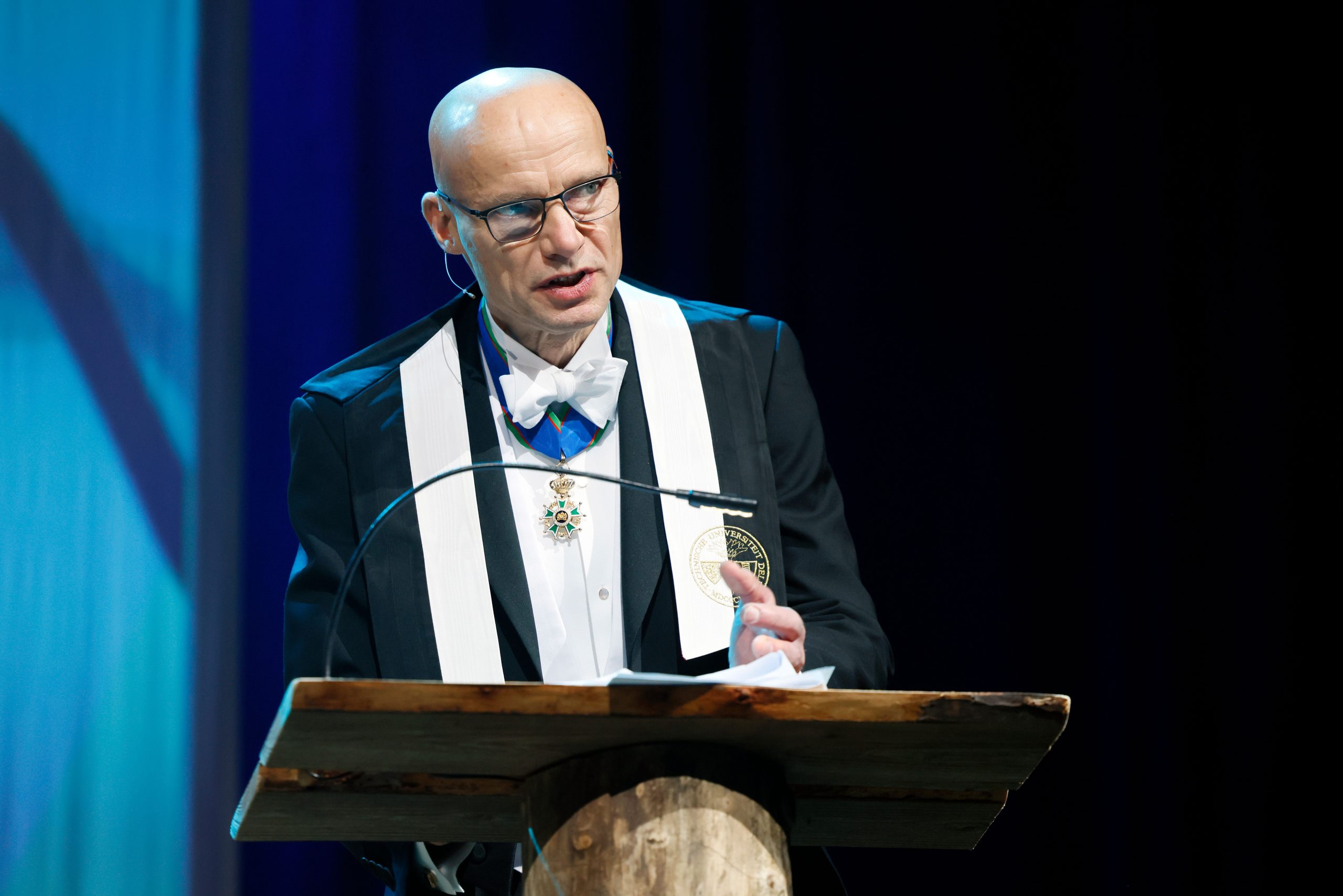Now is the time to make plans for a climate-proof the Netherlands in 2150, stated hydraulic engineering expert Bas Jonkman in his Dies Natalis lecture on Friday. The high water level over the last few months gave his words even greater urgency.
Rector Tim van der Hagen holds an umbrella at the opening of the Dies 2024 themed Redesigning Deltas. (Photo: Thijs van Reeuwijk)
The voice of Gaia, the goddess of the earth, echoed around the Aula. Lasers projected waves above the public, and the Rector took to the stage under an umbrella. TU Delft bowed before nature, that demonstrated its powers so strongly this year. This was often manifested as drought and floods. Even the drinks afterwards were related to nature: a Delft Blue drink with a refreshing green leaf.
The 182nd TU Delft Dies Natalis celebration was held on Friday 12 January 2024 and closed a week overflowing with water. Lectures, workshops, trips to Blijdorp Zoo (Innofari), flood protection in The Green Village and the Flood Proof Holland field lab, to mention a few highlights.
Climate proof

“We need to build with nature and not against it,” argued Professor of Hydraulic Engineering Bas Jonkman (Faculty of Civil Engineering and Geosciences) in his Dies Natalis lecture. Jonkman explains that the Afsluitdijk, like the Delta Works, were only built after a serious flood. So if the Netherlands wants to be climate proof by 2150, we really need to start now and not wait until disaster strikes. He shows that it is likely that the water level will rise by around 1 metre in 2150 .
He goes on to explain that the Delta Works had a clear goal in the last century, and that was to protect the Netherlands from rough seas. The new 21st century Delta Works are a lot more complex and ambitious, as this year’s theme, Redesigning deltas, demonstrates. It is no longer only about water safety, but also about space for nature, liveability, and recreation. We all need to sit at the drawing table. The challenges for river deltas around the world require an integrated and multidisciplinary approach to make the living environment of inhabitants climate proof.
Jonkman zooms in on Rotterdam, which may get an amazing new water barrier. When not in operation, the Hollandkering (Holland barrier, in Dutch) would look like a gigantic arch around the Nieuwe Waterweg (a long shipping canal). Another option is a set of sluice gates instead of what is now an open connection between the city and the sea. Or should the Nieuwe Waterweg that runs between Rotterdam and the Hook of Holland be given a more natural and flowing look than the straight canal that is there now? These are questions for the future water engineers.
Jonkman quotes a predecessor, Cornelis Lely (1854 – 1929), saying “A people that lives, builds on their future.” He goes on to say that “It is now time to plan the Delta Works of the 21st century.”
Online misconduct
“We are being asked a lot”. With these words, Rector Van der Hagen closed the well-attended meeting. He saw this as a confirmation of his intention to expand TU Delft to Rotterdam. He then briefly responded to the increase of negative comments about TU Delft employees on social media. “Things have not improved after Covid,” he said. “But academic freedom is still strong. We have already held onto this for 182 years, and this will not change in the next year.”
Honorary doctorates
As has become customary in the Dies meeting, two new honorary doctorates were awarded to prominent external people. The selection of honorary doctorates usually involves fields of interest to TU Delft, and in this case they were in the field of hydraulic engineering.

The American Kate Orff made a positive impression with her Living Breakwater project, a row of breakwaters off the coast of Manhattan. They were built after hurricane Sandy in 2012 that submerged large parts of New York and flooded subway tunnels. Orff’s major achievement was that she was able to turn the breakwaters into an attraction. Not only did the project make it safer for coastal residents, it also created a habitat for oysters and other marine animals.
Chris Zevenbergen, her Honorary Supervisor at the Faculty of Architecture and the Built Environment, put Orff forward for an honorary doctorate as she was able to turn the design process from a somewhat mundane exercise in aesthetics into a ‘collective, creative, all-encompassing activity to address the challenges’.
“River deltas have always been sources of cultural development,” Orff said in her acceptance speech. “I hope that a redesigned delta will also redesign us.”

On behalf of the Faculty of Technology, Policy and Management, Neelke Doorn put Henk Ovink forward as an honorary doctor. In 2015, Ovink was appointed as the Water Envoy by the Cabinet to make the world aware of both the importance of water and of its dangers. He has headed the Rebuild by Design programme, which was to make New York more resilient after Hurricane Sandy, since 2019. Apart from this, Doorn also saw that Ovink is good in the world of education. He offers young people a safe environment in which they can work on new ideas.
From childhood, Ovink was told that no challenge is too big to take on. His father was an architect from TU Delft and his mother ‘an activist’, he said in his acceptance speech.
“Climate change is a double threat. For our planet and for our neighbourhoods,” Ovink asserted. “Deltas have always acted as a magnifying glass for crises. So we now need to redesign deltas to make our neighbourhoods stronger and safer. We cannot wait.”
- Watch Dies 2024 here, or read the highlights of the Delta Week and the 182nd Dies Natalis.
Do you have a question or comment about this article?
j.w.wassink@tudelft.nl


Comments are closed.